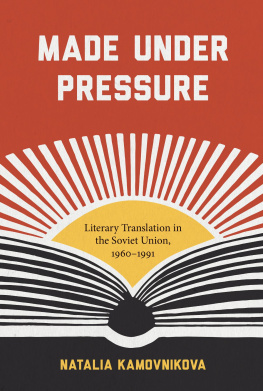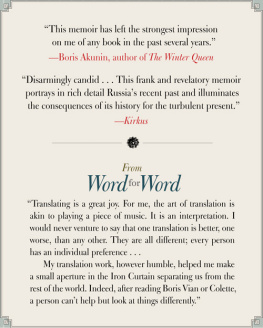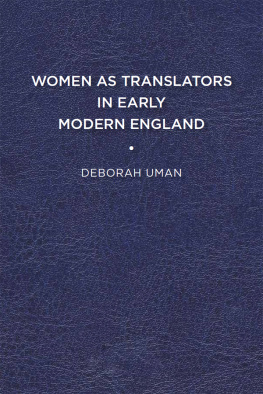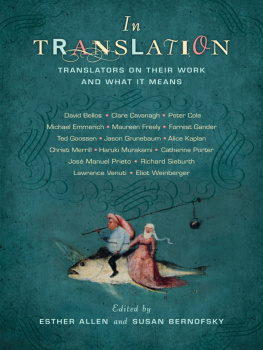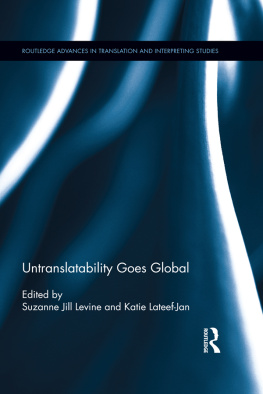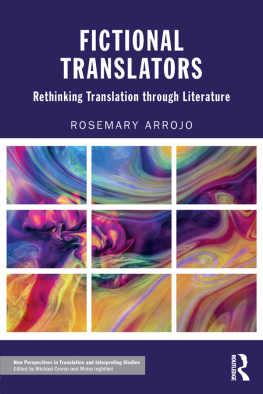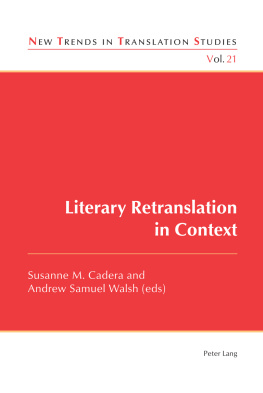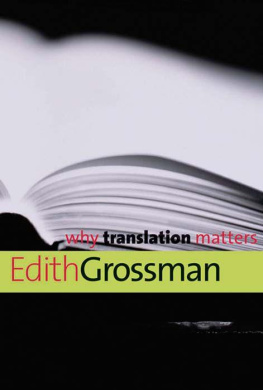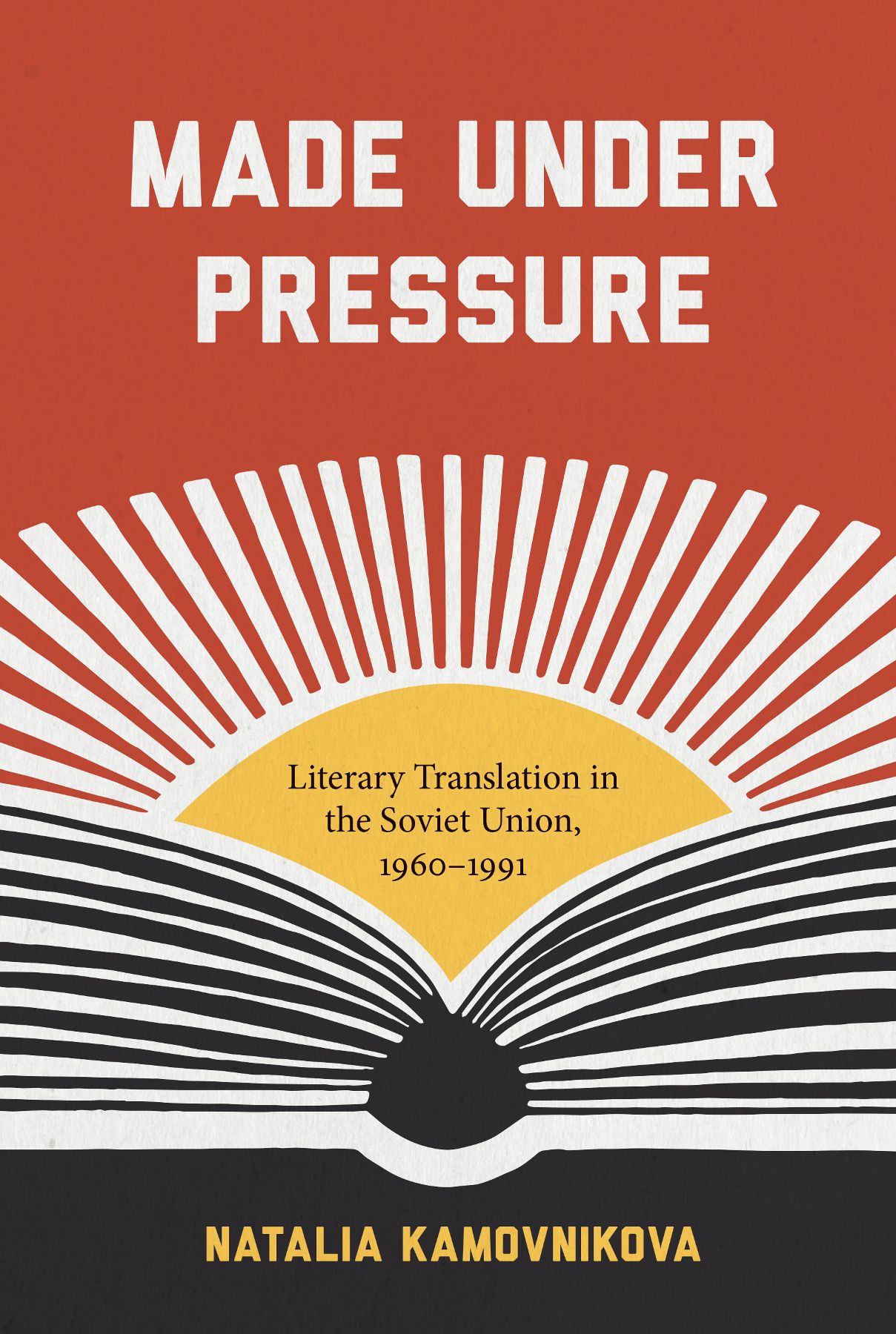
Made Under Pressure
A Volume in the Series
Studies in Print Culture and the History of the Book
Edited by
Greg Barnhisel
Robert A. Gross
Joan Shelley Rubin
Michael Winship
Made Under Pressure
Literary Translation in the Soviet Union, 19601991
Natalia Kamovnikova
University of Massachusetts Press
Amherst and Boston
Copyright 2019 by University of Massachusetts Press
All rights reserved
Printed in the United States of America ISBN 978-1-62534-341-3 (paper); 340-6 (hardcover) Designed by Sally Nichols Set in Minion Pro Printed and bound by Maple Press Inc.
ISBN 978-1-61376-581-4 (e-book)
Cover design by Thomas Eykemans
Cover art by Vilen Karakashev and Lila Levshunova, detail from Soviet poster Knowledge for All c. 1972.
Library of Congress Cataloging-in-Publication Data
Names: Kamovnikova, Natalia, author.
Title: Made under pressure : literary translation in the Soviet Union, 19601991 / Natalia Kamovnikova.
Description: Amherst : University of Massachusetts Press, 2019. | Series: Studies in Print Culture and the History of the Book | Includes bibliographical references and index. | Description based on print version record and CIP data provided by publisher; resource not viewed.
Identifiers: LCCN 2018019162 (print) | LCCN 2018044430 (ebook) | ISBN 9781613765807 (e-book) | ISBN 9781613765814 (e-book) | ISBN 9781625343413 (pbk.) | ISBN 9781625343406 (hardcover)
Subjects: LCSH: LiteratureTranslations into RussianHistory and criticism. | Translating and interpretingSoviet Union. | Soviet literatureTranslationsHistory and criticism.
Classification: LCC PG2984 (ebook) | LCC PG2984 .K35 2019 (print) | DDC 491.78/04dc23
LC record available at https://lccn.loc.gov/2018019162
British Library Cataloguing-in-Publication Data
A catalog record for this book is available from the British Library.
Anna Akhmatovas Russian text by Margarita Novgorodova. Publishing rights acquired via FTM Agency, Ltd., Russia.
Do you know the Russian metaphoric expression Sauerkraut is made under pressure? Well, this is what being a translator meant in those days. The original poets and writers were pressuredthink of Akhmatova, Pasternak, Tsvetaeva. And because the original creative activity was impeded, people would go into literary translation.
Viktor Andreev, translator
Contents
A Round Unvarnished Tale of the Whole Course of Love
The Closed Society and Its Literary Translation Practices
Censorship and the Russian Publishing System through History
The Pyramid of Subordination
Literary Translation and Means of Social Control in the Soviet Union
The Making of a Translator
Old Controversies and New Friendships
Literary Translation as a Profession
Commissions, Earnings, and the Union of Writers
Poetry in Translation
To Match or Not to Match
The Invisible Hand of Censorship
A Farewell to Fear
Translation Activism
How Far That Little Candle Throws His Beams
Literary Translation under Restrictions
Two Case Studies
Personalia
Most personal names are given here in the Library of Congress system of Cyrillic transliteration without diacritics. In cases where a particular Russian name has become widely recognized, I preserve its traditional English spelling. For example, I chose to spell the name of the poet Osip Mandelstam in the traditional way; however, I spell it as Mandelshtam when speaking about the translator Isai Mandelshtam, although the poet and the translator share the same last name in the Russian language. I also spell Lev Tolstoy and not Lev Tolstoi, Joseph Brodsky and not Iosif Brodskii.
The exceptions also pertain to the names of Russian families of German descent; thus, I use Alexander von Benckendorff and not Aleksandr fon Benkendorf, rkadii Steinberg and not rkadii Shteinberg. The names of the Romanov dynasty are presented in their historical spelling, hence Paul I, Alexander I, Nicholas I, and so on. Names of modern Russian writers, poets, and critics, the spelling of whose names has been secured by their foreign publications, are presented here in the way they appear in Western print, for example, Oleg Juriev and not Oleg Iurev.
The names of the translators who gave interviews for the book are presented here according to their personal preference, therefore see Witkowsky and not Vitkovskii, Yasnov and not Iasnov.
For the sake of convenience, Russian names are generally presented in the form of the given name plus last name. In the biographies, however, I use the complete forms of Russian names, which traditionally consist of three parts: the given name, the patronymic, and the last name. I also preserve the polite form of the given name plus the patronymic in the quoted interviews and several other instances, where the use of the patronymic is socially and stylistically mandatory. Thus, the students of Elga Linetskaia refer to her as Elga Lvovna, and the students of Efim Etkind call him Efim Grigorevich.
All translations of quoted text are my own, unless otherwise indicated.
This book was planned as a study of literary translation under pressure, and state control. It turned out to be a story of passion. Literary translation is known to require concentration, composure, and reserve from those engaged in it. I realized it was the passion of translators for literature, their respect for the written and spoken word, and their desire to share and spread knowledge that gave numerous literary works a second life in a new culture. This commitment to literature and languages made translators choose modern unconventional works of literature and find ways to publish their translations of these works despite all obstacles.
The process of writing this book is also a unique story, which is best described as a story of friendship. I started the project keen on acquiring knowledge. But now I realize that together with knowledge I received another gift: the friendship of many extraordinary and talented people. I thank them for opening up to mea complete stranger at that timeand for sharing their life histories with me. I thank Irina Komarova, Maiia Kviatkovskaia, Larisa Bespalova, Viktor Golyshev, Viktor Andreev, Inna Streblova, Sergei Stepanov, Mikhail Yasnov, and Evgenii Witkowsky for the memories they shared with me, as well as their kindness, understanding, and encouragement. It is their generosity and encyclopedic knowledge that made this book possible. I grieve the death of Ignatii Ivanovskii, to whom I am grateful for his contribution to this book, for his example of optimism and courage in the face of illness, and for his wonderful poems that he continued to read to me over the phone until three weeks before his death.
I am most indebted to Maria Tymoczko, who told me a book based on interviews could be an interesting project. Her invaluable advice and personal example have been a source of inspiration to me throughout the time I was working on the book.
I owe a debt of gratitude to my dear teacher Irina Arnold, who is very much missed. She would often repeat that the main qualities of a researcher are an interest in other people and the talent of maintaining friendships. This lesson was extremely valuable for this bookas well as all her lessons, which I treasure in my memory.
The extensive library support that I received from my friends and colleagues is inestimable and deserves my special acknowledgment. I thank the extraordinary librarian Tatiana Borisova for her energy and her almost telepathic ability to find exactly the books I needed even before I asked for them. I thank Outi Paloposki and Daniele Monticelli for granting me access to their university libraries when I needed it most.
Next page
